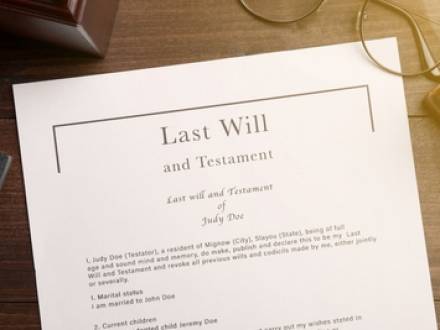 28 N. 1st St., Suite 101, Geneva, IL 60134
28 N. 1st St., Suite 101, Geneva, IL 60134
What Happens When a Will Is Improperly Executed in Illinois?
 Estate planning documents, including wills and trusts, may be among the most important documents a person will ever sign. However, in Illinois, sometimes even the slightest mistake in how the document is executed can result in the will being invalidated.
Estate planning documents, including wills and trusts, may be among the most important documents a person will ever sign. However, in Illinois, sometimes even the slightest mistake in how the document is executed can result in the will being invalidated.
An improperly executed will can lead to delays in probate, court challenges, and bitter family disputes. Understanding what Illinois law requires and having a highly experienced DuPage County, IL estate planning attorney guiding you through the process can make a significant difference in whether your will is executed correctly.
What Are the Basic Illinois Will Execution Requirements?
Under the Illinois Probate Act (755 ILCS 5/4-3), the requirements for a will in the state include:
- The will must be in writing (oral wills are not permitted).
- The will must be properly signed by the testator (the person making the will).
- The will must be attested to by two credible witnesses who are not beneficiaries.
- While notarization of the will is not required in Illinois, it is recommended.
Witnesses are meant to confirm the testator’s capacity and whether the will is being made voluntarily, which is why the choice of witnesses is important and should have some thought put into it.
What Are Execution Errors That Can Potentially Invalidate a Will in Illinois?
Key execution errors that can cause serious problems during probate include:
Improper Signing or Witnessing
The testator must sign the will. Two credible witnesses must be present to watch the testator sign the will and acknowledge the signature. Credibility encompasses someone who is 18 years or older with a sound mind, is not a beneficiary in the will (so is impartial), and whose character for honesty is well known. The witness must have properly observed and understood the will signing.
The Will Does Not Include a Revocation Clause
A properly drafted will in Illinois should include a clause that revokes any prior wills. If the revocation clause is missing, an older will could still be considered valid. This minor issue can create significant conflicts between heirs and in the probate court.
The Testator Failed to Sign the Will, or There is a Suspicion That the Signature Was Forged
The testator must always sign the will in the presence of the two witnesses, and the witnesses must actually see the testator sign the will. When there is a suspicion that the testator’s signature was forged, then the witnesses would also fall under suspicion.
The Will Has Document Integrity Issues
If a page or pages of the will are missing, a revision is incomplete, or there are issues with the witnesses' signatures or notarization, then the will may be invalidated. If the will appears to be "slip-sheeted," which means an original page was replaced with an amended one, or a specific clause was changed after the will was executed, then the will’s validity may be called into question.
What About Remotely Executed Illinois Wills?
The state passed the Electronic Will and Remote Witnesses Act, which took effect on January 1, 2025, and permits the signing of wills using remote technology, provided all applicable legal requirements are met. The requirements for a will that is executed remotely are even more stringent. The will must be created in a manner that makes any changes obvious.
Witnesses can participate in the signing process remotely via real-time video conferencing. Witnesses must sign a separate affidavit declaring all signing formalities were met, and the will must be notarized. The witnesses and notary must be able to verify the testator’s identity, often by having the testator hold up his or her ID to the camera.
Contact a Kane County, IL Estate Planning Lawyer
If you are unsure whether a loved one’s will meets the strict legal requirements in Illinois, or if you suspect the document was improperly signed or witnessed, you need a highly skilled DuPage County, IL probate attorney from DLAW, PC. Attorney Walker is personally involved with each of her clients and has more than 25 years of legal experience. To schedule your free initial consultation, call 331-222-7978.


 331-222-7978
331-222-7978

